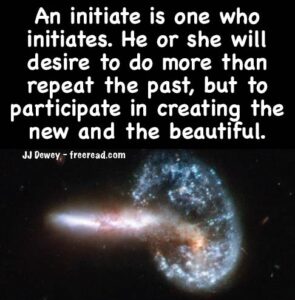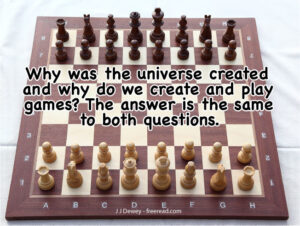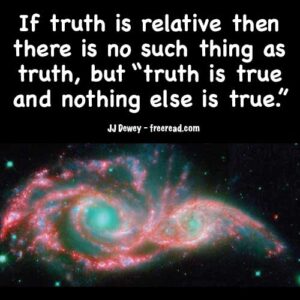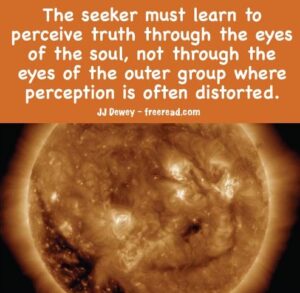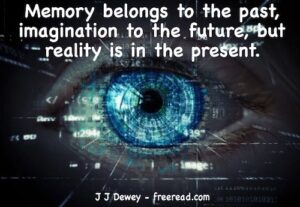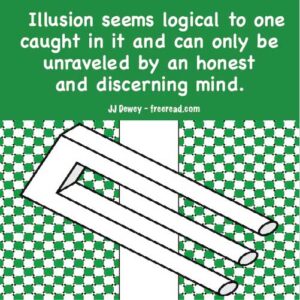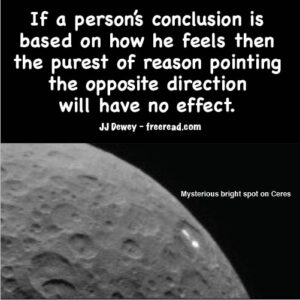
Reasonable Logic
Reader: I highly respect many things you teach. As a teacher of truth you have been one of the most reliable I have known. I value your friendship. However sometimes I don’t think you always “play fair.”
JJ: Not playing fair is something I am rarely accused of as I always try and play as fair as possible. When someone sees me as not playing fair it is usually because I return similar tactics as my opponent uses in an attempt to nudge them to higher ground.
Reader: As a friend I see this as a fault, and I know that I most certainly have my own serious faults, among them a highly developed dislike of losing arguments. As a friend I think you sometimes share this fault with me. 🙂
JJ I do not mind losing an argument if I am wrong because it means I am learning something new. I may not appear to have this attitude and it is for this reason: I will not yield in an argument when my opponent presents no evidence that I am wrong and I see that I am standing on correct principles. It would be deceptive for me to deny that which I see as correct.
I will add this. I would much rather lose an argument in dealing with principles than one that involves defining terms and words. If I lose the former then I attain a higher understanding of a principle. If I lose the latter, I learn some new data with marginal usefulness.
Also, about half the arguments in this group occur because the other person is not clearly seeing what I (or someone else is saying) so I will stand in there until what is being communicated is understood. Correct communication will often show there was no argument to begin with, but only a misunderstanding or the two having a different definition of words.
I’d say in about half of our arguments there was really no disagreement but misunderstanding instead.
Reader: Please accept the following as the criticism of a friend.
Quoting JJ: “One never has full knowledge so I guess everything every person does is prejudiced in your view.”
This one sentence pretty much illustrates one of your most annoying traits. You are much like a lawyer (that is not a compliment) who breaks down everything that someone else says and micro-analyzes every word to try to show that someone is saying something different than what they intended.
JJ But I was throwing back to you the same thing you did to me.
Let me repeat the statement you made that drew such a response: “I can appreciate your experience with some “logicians,” however to say “I wouldn’t waste my time” sounds to me like a particularly prejudiced approach (“prejudice” as to “pre-judge without full knowledge”).”
Instead of accepting my statement at face value you pulled the attorney thing yourself and dissected my statement and found unjustified fault with it. You also created a straw man which was a nonexistent prejudiced JJ from which to base your argument. You have little idea of the vantagepoint from which I based my decision to not spend time with a course in logic, thus you have no idea if I am prejudiced or not. You have also created a second straw man of extending this to the idea that I do not think such a course is worthwhile for anyone when I have never said such a thing.
True prejudice always results in error and the way to show prejudice is to show the error rather than to proclaim it through a straw man argument.
The word “prejudice” is also an inflammatory and judgmental word to use that I would not use in return with you. If I thought you were prejudiced, I would attempt to illustrate it so you could see your error rather than to pronounce it upon you – unless I just wanted to cause irritation.
Reader: It is the classic case of not “seeing the forest for the trees.”
In logic “a straw-man argument is the practice of refuting a weaker argument than an opponent actually offers. To ‘set up a straw man’ is to create a position that is easy to refute, then attribute that position to your opponent. A straw-man argument can be a successful rhetorical technique (that is, it may succeed in persuading people) but it is also a logical fallacy, since the argument actually presented by your opponent has not been refuted, only a weaker argument.”
JJ: I used no more of a straw man than you did. If you do not like the straw man then you shouldn’t force my hand by using it yourself.
Reader: Now let’s take your reply above. Do you REALLY suppose that I was saying that one must have FULL knowledge in the sense of ABSOLUTE, COMPLETE, and EXHAUSTIVE knowledge? Or do you think that perhaps you might give me some benefit of the doubt that I meant “full” in the sense of “sufficient,” or “full” in the sense of the kind of “full knowledge” one might have if one had studied a subject in some detail?
JJ: You accused me of being prejudiced for not having “full knowledge.” You did not give me the benefit of the doubt as far as my motive so I did not give it back to you. I was attempting to make you reflect on your approach, which seemed unfriendly.
Reader: No. You go on as if there is no doubt that I meant that one is prejudiced if they don’t have FULL, ABSOLUTE, and EXHAUSTIVE knowledge of the subject:
JJ: You’re the one who first said I was prejudiced because I did not have “full knowledge.”
Reader quoting me: “Actually, you only need partial knowledge to be fairly non-prejudicial.”
I should know from experience that one has to be incredibly careful in their choice of words in arguing with you because you will repeatedly use the “straw man” argument in one “micro analysis” after another. You will take one word – like this – and analyze it and impute the worst possible meaning to your opponent and then show how the straw man you have constructed is ridiculous.
JJ This is what I felt you did with me first.
Reader: In any case, and for the record, it is not my position that one must have FULL, ABSOLUTE, and EXHAUSTIVE knowledge to avoid prejudice. It IS my position that one must have at least some knowledge of a subject that comes from methodical study before one can declare it a waste of time.
JJ: If this is your stand then you have no real cause to call me prejudiced for I feel I had enough knowledge to make my decision and that I did not need “full knowledge” as you previously said.
Reader: Any reasonable person knows that humans almost ALWAYS work from partial knowledge. The question is whether the person has honestly tried to get sufficient knowledge before making a judgment. What constitutes “sufficient” is obviously also a matter of judgment and wisdom.
JJ: Yes, and why do you not give me the benefit of the doubt that I assessed the situation with honesty and made a reasonable judgement from my vantage point? Why jump to the conclusion that I am prejudiced when such accusation was not necessary in our communication?
You then give some of your thoughts on what you think logic is and how it works, most of which I have no problem.
Reader: I understand what you are saying, but your use of the word (logic) is not technically correct. It IS important to define your terms exactly.
JJ Is this another straw man? I did define my terms. I said I accepted my Random house dictionary definition, which is: “the science of correct or reliable reasoning.” I like this because it is concise to the point and short and sweet.
If you want more here are the first definitions (which are the most commonly used) from other dictionaries:
“The Science of reasoning; the science of the operations of the understanding subservient to the estimation of evidence, truths, or admitted propositions not previously admitted and all intellectual operations such as classifying and judging, subsidiary to this.” Websters Unabridged Twentieth Century Dictionary
“The science that investigates the principles governing correct or reliable inference.”Websters Encyclopedic Unabridged Dictionary Also exactly repeated in my American College Dictionary
“The normative science which investigates the principles of valid reasoning and correct inference, either from the general to the particular (deductive logic) or from the particular to the general (inductive logic).” Funk & Wagnalls Standard Dictionary
“Theory of reasoning: the branch of philosophy that deals with the theory of deductive and inductive arguments and aims to distinguish good from bad reasoning.” Encarta Dictionary
I have no problem with any of these definitions, but think the Random house is the most concise. I always use words as they are commonly understood unless I redefine or expand the definition to aid in communication.
Reader: It is important to understand that formal logic like a syllogism will tell you that your conclusion is absolutely true if the premises are true. Knowing that, then you can focus on the reliability of the premises as a separate issue, and not confuse that issue with the mechanism of taking the premises to a conclusion – which IS logic.
JJ: This may be what some college course teaches but what kind of logic would be transpiring to start with an illogical premise such as the moon is made of green cheese? The first step in practical logic is to examine the premise. If you do not do this then every definition I gave from the various dictionaries does not apply.
Quoting JJ “Logic tells you a lot about the premise.”
Reader: No. Reason, or rationality can tell you a lot about the premises.
JJ: Now who’s splitting hairs? You cannot reason without using some degree of logic and since the dictionary says logic is “the science of correct or reliable reasoning” then you cannot use logic without some degree of reasoning being involved.
You can’t use reason to discover the truth of a premise without applying some logic.
Reader: Again, we ALL use many of these word ambiguously all the time. But sometimes one needs to use precise definitions (and this is one case where one does need to).
JJ: I do not believe you have given a precise definition. Maybe this would help in our communication.
Reader: Again, this comes down to HOW were are using the word “logic,” and the fact that you refuse to accept that logic does have a very precise meaning.
JJ: The Random House dictionary has a precise definition to which I adhere. Do you have one? Why do you accuse me of not having a precise definition when I have given you one?
Reader: That meaning is NOT arbitrary.
Is us useful to separate how we argue GIVEN the premises, and the separate issue of how we evaluate the premises themselves.
JJ: There may be a minority school of thought that does not define logic as being connected to the premises, but what you are saying does not agree with the first definitions of the dictionaries quoted above – nor does it equate with the common use of the word “logic.” And finally, it is not a logical approach because it leads to erroneous conclusions. Logic is supposed to be an aid to reach correct conclusions. If you start with the accepted premise that the moon is made of green cheese all results will be flawed so logic around this idea is useless.
Reader: It is useful because we CANNOT always prove our premises.
JJ: Then you are arguing with an unsubstantiated belief and cannot expect an accurate result.
Reader: It is useful because we can study the validity of argumentative methods SEPARATE from the validity of the premises.
JJ This is fine if you are taking a college course on such a thing, but such approach is miles away from the discovery of truth, which we are seeking here.
Reader: Again, what you are talking about is “reason” which is a much bigger thing that logic, which is only a part of “reason.”
JJ: No. If I say I am talking about logic then I am talking about logic. Of course, logic and reason are intertwined so you cannot completely isolate the two.
Reader quoting JJ “Perfect logic will never lead to a wrong conclusion.” I am still waiting for anyone to refute this.
Reader: If you accept the generally accepted meaning of “logic” then it has been refuted.
JJ: And this was done when and with what words?
Reader:The fallacy is that one CAN by reason – not speaking of revelation or intuition – reasonably know whether one’s premises are exactly true in all cases.
JJ: I never said this.
Reader: Imperfect human beings cannot create perfect logic. All logic is conditional on the imperfection of its practitioners.
JJ: Mathematics is perfect logic available to us all.
Reader: Basically what you are saying that if we have PERFECT knowledge of the truth of the premises, and then apply PERFECT logic then our conclusion must also be PERFECT.
JJ: No. That’s not what I am saying, but you must have a reasonable knowledge of the premise or the logic derived therefrom is useless. Perfect (or flawless) logic is much different than a perfect premise.
Reader: How is that helpful for imperfect beings?
JJ: Starting with a reasonable premise that is somewhat understood is very helpful to imperfect humans in the discovery of truth.
Reader: If God is itself not absolutely perfect (as you teach), but BECOMING, then how is it useful to speculate on PERFECT knowledge of premises, logic, etc?
JJ: You’re putting words in my mouth. I never talked about a perfect premise, but perfect logic.
Larry: How are we to understand your PERFECT LOGIC when elsewhere you reject the absolute perfection even of God?
JJ This is the straw man that you do not like. One has nothing to do with the other.
If you guess at a true or false question you logically have a 50/50 chance of being correct. Even if you choose incorrectly, you still used flawless logic in perfectly assessing your guess as having a 50% chance of being correct. The logic is flawless because it cannot be improved.
Flawless logic does not create perfection just as in this case flawless logic does not produce a perfect score on a test where the answers are unknown. You did, however, produce a perfect assessment of your chances of success.
God and man can both apply perfect logic and make many mistakes in time and space as they proceed toward the unknown. But the reasonable and logical person will correct his mistakes and move onward toward relative perfection.
Reader: JJ and I have argued repeatedly down the years over the meaning of words and ideas. Sometimes he has changed my mind. Sometimes he has not. But in the end I find we are amazingly close once the cloud of illusion that comes from trying to communicate is finally dispelled.
JJ: Yes, I think we are very close on most issues. We use a different approach to discovery and this causes some miscommunication and misunderstanding.
I think that if we seek to feel into each other’s hearts, souls and intent that many of our arguments will be solved before they surface.
Let me sum this up by saying this. What we have here is merely an apparent disagreement caused by how the two of us differently define our terms. If we both used the same definition of terms, I do not think we would disagree. I can see why college courses will use an illogical premise followed by logic, but that is not a helpful approach in the pursuit of truth. First one must carefully examine the premise.
To look backward for a while is to refresh the eye, to restore it, and to render it the more fit for its prime function of looking forward. Margaret Fairless Barber
Dec 26, 2005
Copyright by J J Dewey
Index for Original Archives
Index for Recent Posts
Easy Access to All the Writings
For Free Book go HERE and other books HERE
JJ’s Amazon page HERE
Check out JJ’s Facebook Group HERE
Follow JJ on Twitter @JosephJDewey HERE
Check out JJ’s videos on TikTok HERE:
